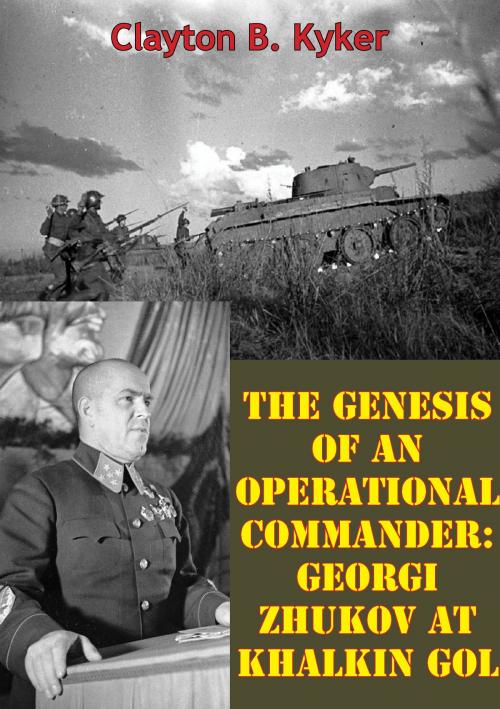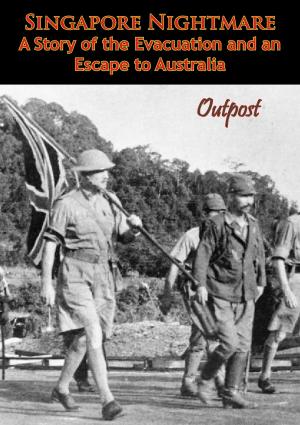The Genesis Of An Operational Commander: Georgi Zhukov At Khalkin Gol
Nonfiction, History, Germany, European General, Military, United States| Author: | Clayton B. Kyker | ISBN: | 9781786250643 |
| Publisher: | Verdun Press | Publication: | November 6, 2015 |
| Imprint: | Verdun Press | Language: | English |
| Author: | Clayton B. Kyker |
| ISBN: | 9781786250643 |
| Publisher: | Verdun Press |
| Publication: | November 6, 2015 |
| Imprint: | Verdun Press |
| Language: | English |
The Red Army’s defeat of the Germans during the Second World War is one of the great achievements in military history. The military man most responsible for that victory was Marshal Georgi Zhukov. Though less well known than some of his German or allied counterparts, Zhukov was a brilliant practitioner of a distinctive, and uniquely Soviet, style of operational art. This style was first tested against the Japanese Kwangtung Army at Khalkin Gol in Mongolia. Zhukov’s operational scheme at Khalkin Gol was the prototype for his later successes at Moscow, Stalingrad, and Kursk.
Zhukov and the Red Army came of age together. Both rose from the ashes of the Tsarist Army and endured two decades of war, debate, reform and crisis. While Zhukov rose through the ranks of the cavalry, the Red Army underwent a period of great intellectual activity. By the mid 1930’s, Soviet military theorists began to explore new concepts of successive or “deep” operations that promised to avoid the positional warfare of World War One. During this period, Zhukov became an avowed “tankist” and was extremely well placed to participate in this “renaissance.”
When Stalin launched his purge of the Red Army in 1937, Zhukov was a Corps Commander. Though interrogated at length, he survived. In 1939, Zhukov, then a Deputy Military District Commander, was summoned to Moscow. Zhukov was relieved to find that he had been ordered to proceed to Khalkin Gol in Mongolia where Soviet troops were facing a Japanese incursion across the border.
After assessing the situation, Zhukov prepared a plan to drive the Japanese out of Mongolian territory. Upon assuming command and conducting a massive build-up of combat power, Zhukov launched a devastating offensive spearheaded by massed tanks and artillery that would become the prototype for Soviet offensives during the Second World War.
The Red Army’s defeat of the Germans during the Second World War is one of the great achievements in military history. The military man most responsible for that victory was Marshal Georgi Zhukov. Though less well known than some of his German or allied counterparts, Zhukov was a brilliant practitioner of a distinctive, and uniquely Soviet, style of operational art. This style was first tested against the Japanese Kwangtung Army at Khalkin Gol in Mongolia. Zhukov’s operational scheme at Khalkin Gol was the prototype for his later successes at Moscow, Stalingrad, and Kursk.
Zhukov and the Red Army came of age together. Both rose from the ashes of the Tsarist Army and endured two decades of war, debate, reform and crisis. While Zhukov rose through the ranks of the cavalry, the Red Army underwent a period of great intellectual activity. By the mid 1930’s, Soviet military theorists began to explore new concepts of successive or “deep” operations that promised to avoid the positional warfare of World War One. During this period, Zhukov became an avowed “tankist” and was extremely well placed to participate in this “renaissance.”
When Stalin launched his purge of the Red Army in 1937, Zhukov was a Corps Commander. Though interrogated at length, he survived. In 1939, Zhukov, then a Deputy Military District Commander, was summoned to Moscow. Zhukov was relieved to find that he had been ordered to proceed to Khalkin Gol in Mongolia where Soviet troops were facing a Japanese incursion across the border.
After assessing the situation, Zhukov prepared a plan to drive the Japanese out of Mongolian territory. Upon assuming command and conducting a massive build-up of combat power, Zhukov launched a devastating offensive spearheaded by massed tanks and artillery that would become the prototype for Soviet offensives during the Second World War.




![Cover of the book NEW ZEALAND DIVISION 1916-1919. The New Zealanders In France [Illustrated Edition] by Clayton B. Kyker](https://www.kuoky.com/images/2014/june/300x300/9781782892427-VkWo_300x.jpg)
![Cover of the book With The Trench Mortars In France [Illustrated Edition] by Clayton B. Kyker](https://www.kuoky.com/images/2014/june/300x300/9781782892496-2FUQ_300x.jpg)








![Cover of the book Falklands, Jutland And The Bight [Illustrated Edition] by Clayton B. Kyker](https://www.kuoky.com/images/2014/august/300x300/9781782895343-3MPz_300x.jpg)
